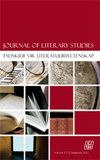Food, Masculinity and Gender-based Violence in Sally Andrew’s Recipes for Love and Murder (2015)
IF 0.1
4区 文学
0 LITERARY THEORY & CRITICISM
引用次数: 2
Abstract
Summary This article offers a reading of Sally Andrew’s debut murder mystery novel, Recipes for Love and Murder: A Tannie Maria Mystery (2015), from the angle of critical food studies. The article explores how the novel’s depiction of food relates to notions of masculinity and power against the backdrop of widespread gender-based violence in South Africa today. I argue that the protagonist and narrator’s reverent, restorative relationship with food represents a gentle yet powerful feminine counternarrative to the violent masculinities of subjugation embodied in Fanie’s dogmatic religious ideology, Dirk’s oppressive military indoctrination, and Cornelius’s cruel hunting practices. Beyond providing mere escapism, this supposedly “popular” novel can therefore be seen as delivering sharp, timely social commentary.莎莉·安德鲁《爱与谋杀的食谱》中的食物、男子气概和性别暴力
本文从批判性食物研究的角度解读莎莉·安德鲁的处女作谋杀悬疑小说《爱与谋杀的食谱:一个坦妮·玛丽亚之谜》(2015)。这篇文章探讨了小说中对食物的描述是如何与当今南非普遍存在的性别暴力背景下的男子气概和权力概念联系起来的。我认为,主人公和叙述者对食物的虔诚、修复关系代表了一种温柔而有力的女性反叙事,这种反叙事体现在范妮教条的宗教意识形态、德克压迫性的军事灌输和科尼利厄斯残酷的狩猎行为中。除了提供纯粹的逃避现实,这本所谓的“流行”小说因此可以被视为提供了尖锐、及时的社会评论。
本文章由计算机程序翻译,如有差异,请以英文原文为准。
求助全文
约1分钟内获得全文
求助全文
来源期刊

Journal of Literary Studies
Multiple-
CiteScore
0.50
自引率
0.00%
发文量
0
期刊介绍:
The Journal of Literary Studies publishes and globally disseminates original and cutting-edge research informed by Literary and Cultural Theory. The Journal is an independent quarterly publication owned and published by the South African Literary Society in partnership with Unisa Press and Taylor & Francis. It is housed and produced in the division Theory of Literature at the University of South Africa and is accredited and subsidised by the South African Department of Higher Education and Training. The aim of the journal is to publish articles and full-length review essays informed by Literary Theory in the General Literary Theory subject area and mostly covering Formalism, New Criticism, Semiotics, Structuralism, Marxism, Poststructuralism, Psychoanalysis, Gender studies, New Historicism, Ecocriticism, Animal Studies, Reception Theory, Comparative Literature, Narrative Theory, Drama Theory, Poetry Theory, and Biography and Autobiography.
 求助内容:
求助内容: 应助结果提醒方式:
应助结果提醒方式:


